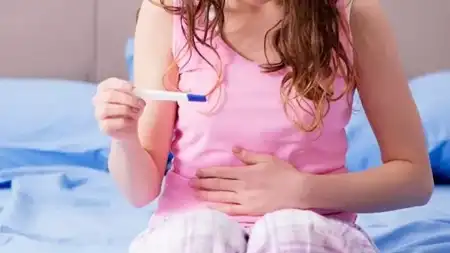
What is Infertility in Women?
Infertility in women is a condition that affects millions of couples worldwide. It is defined as the inability to conceive after 12 months of regular, unprotected intercourse, or after six months if the woman is over 35.

Infertility is not just a medical issue but can also have emotional and social effects, often causing stress, anxiety, and frustration in couples. The good news is that most causes of female infertility are treatable with modern medicine, lifestyle changes, or assisted reproductive technologies.
Female infertility can occur due to various factors that affect the reproductive system. It is important to understand that infertility does not always mean permanent sterility. Many women with infertility can conceive with proper medical care and support.
Sometimes, infertility is caused by problems in the woman, sometimes by issues in the male partner, and sometimes by both. Around one-third of infertility cases are due to female factors, one-third due to male factors, and the remaining cases involve both partners or are unexplained.
Common Causes of Female Infertility
- Ovulation Disorders: Ovulation disorders are one of the most common causes of female infertility. Conditions like Polycystic Ovary Syndrome (PCOS), thyroid problems, and hormonal imbalances can prevent regular egg release. Without ovulation, pregnancy is not possible. Hormonal tests and ultrasound scans can help identify ovulation problems, which can often be treated with medications or lifestyle adjustments.
- Blocked Fallopian Tubes: Fallopian tubes carry eggs from the ovaries to the uterus. Blockages due to infections, surgeries, or endometriosis can prevent eggs and sperm from meeting. Procedures like hysterosalpingography (HSG) or laparoscopy help identify and sometimes correct blockages, improving fertility naturally or through assisted techniques.
- Endometriosis: It is a condition where tissue similar to the uterine lining grows outside the uterus, affecting the ovaries, fallopian tubes, or the pelvis. This can lead to pain, inflammation, and fertility problems. Surgery, medications, or IVF may be needed depending on severity.
- Uterine or Cervical Problems: Abnormalities such as fibroids, polyps, or structural issues in the uterus can affect implantation. Cervical problems, including abnormal mucus or scar tissue, may also reduce fertility. Many of these issues can be treated surgically or through medications.
- Age-Related Factors: Fertility naturally declines with age, especially after 35 years, due to a decrease in the number and quality of eggs. Women over 40 may face increased difficulty in conceiving and higher risk of miscarriage. Egg freezing and early fertility planning can help preserve fertility for later years.
- Lifestyle Factors: Obesity, smoking, excessive alcohol, poor diet, and stress can impact fertility by affecting ovulation and hormonal balance. Maintaining a healthy lifestyle, managing stress, and following a balanced diet can improve reproductive health and support treatments.
Signs and Symptoms of Female Infertility
Infertility does not always have obvious symptoms. Some women may experience:
- Irregular or absent menstrual cycles
- Very painful periods
- Abnormal bleeding or spotting
- Difficulty conceiving despite regular attempts
In many cases, the first sign of infertility is the inability to get pregnant. Early medical evaluation is important, especially if there are other symptoms or risk factors.
Diagnosis of Female Infertility
Medical evaluation involves a detailed history, physical examination, and a series of tests:
- Blood Tests: Check hormone levels, ovulation, and ovarian reserve.
- Ultrasound: Examines ovaries, uterus, and endometrial lining.
- Hysterosalpingography (HSG): An X-ray test to check fallopian tube patency.
- Laparoscopy: Minimally invasive surgery to examine reproductive organs and treat issues like endometriosis.
- Semen Analysis: Male partner evaluation is also essential to identify combined causes.
These tests help identify the root cause of infertility and guide the appropriate treatment plan.
Sometimes, even after thorough testing, no specific cause is found. This is called unexplained infertility. While it can be frustrating, many couples succeed with treatments like ovulation induction, IUI, or IVF. Patience, persistence, and emotional support are key in these cases. Lifestyle optimisation and medical guidance improve the chances of success.
When to Seek Help
Women under 35 should consult a fertility specialist after 12 months of trying without success, while women over 35 should seek help after 6 months. Early evaluation increases treatment success and helps identify problems before they worsen. Both partners should be evaluated, as male infertility can also contribute. Choosing an experienced fertility specialist, asking questions, and understanding treatment options are crucial steps in the journey.
Female Infertility Treatment Through Homoeopathy
Diagnosis and Homoeopathic Approach
In homoeopathy, infertility is treated after a thorough case analysis, which includes:
- Personal and family medical history
- Menstrual cycle patterns and symptoms
- Emotional and psychological factors
- Lifestyle habits and overall constitution
Homoeopathic treatment is individualised, meaning two women with the same medical diagnosis may receive different remedies based on their symptoms, personality, and physical and emotional state. Remedies stimulate the body’s self-healing ability, regulate hormones, improve ovulation, and support uterine and ovarian health.
Common Homoeopathic Remedies for Female Infertility
Some commonly used remedies in homoeopathy, tailored to individual needs, include:
- Sepia – For hormonal imbalances, irregular periods, and fatigue.
- Pulsatilla – For delayed ovulation, irregular cycles, and emotional stress.
- Lachesis – For women with menstrual irregularities, especially before menopause.
- Natrum Muriaticum – For stress-related infertility, emotional suppression, and irregular menstruation.
- Calcarea Carbonica – For overweight women with delayed cycles or slow metabolism.
Important: Remedies are prescribed only after detailed consultation by a qualified homoeopath. Self-medication is not recommended.
Complementary Measures for Fertility Support
- Diet and Nutrition
A balanced diet rich in fresh vegetables, fruits, whole grains, and protein supports reproductive health. Avoid processed foods, excess sugar, and trans fats. - Stress Management
Meditation, yoga, and mindfulness techniques help manage stress, which can interfere with ovulation and hormonal balance. - Exercise
Moderate exercise improves blood circulation, hormonal balance, and overall health. Over-exercising, however, can negatively affect fertility. - Avoiding Toxins
Smoking, alcohol, and environmental toxins can affect reproductive health. Eliminating these improves the chances of conception.
Homoeopathy and Assisted Fertility
Homoeopathy can be used alongside conventional treatments like IVF or IUI to improve hormonal balance, reduce stress, and enhance the body’s natural healing process. Many women report improved treatment outcomes and better physical and emotional resilience with supportive homoeopathic care.
Emotional Support During Infertility
Infertility can be emotionally challenging. Homoeopathy considers both physical and emotional health. Counselling, support groups, and lifestyle adjustments help reduce anxiety, improve emotional well-being, and support the fertility journey. Emotional balance is essential for conception, as stress and negative emotions can impact hormonal function.
When to Seek Homoeopathic Consultation
Women experiencing difficulty conceiving should seek professional help if:
- They are under 35 and unable to conceive after 12 months
- They are over 35 and unable to conceive after six months
- They have irregular cycles, hormonal imbalances, or recurrent miscarriages
Early consultation allows homoeopathy to work gently and effectively, aiming to restore natural fertility and overall health.
Infertility in women is a multifactorial condition, influenced by hormonal, structural, and lifestyle factors.
Homoeopathy offers a natural, gentle, and individualised approach, aiming to restore hormonal balance, improve reproductive health, and enhance overall well-being. While results may take time, homoeopathic treatment works alongside lifestyle modifications, emotional support, and conventional fertility treatments to give women the best chance of conception. With patience, guidance from a qualified homoeopath, and a balanced approach to health, many women can successfully overcome infertility and realise their dream of motherhood.
Why choose Dr. Sanjay’s Homoeopathy for Female Infertility treatment in Lucknow, India?
Dr. Sanjay’s Homoeopathy is a trusted clinic for safe and effective Female Infertility treatment in Lucknow, India. With years of expertise, Dr. Sanjay is one of the best Female infertility doctors in Lucknow, India, and provides specialised homoeopathy treatment that helps manage hormonal imbalances, irregular periods, ovulation problems, PCOS, and stress-related infertility naturally without side effects. As a leading homoeopathic doctor for female infertility in Lucknow, he follows international treatment standards and offers personalised care that focuses on improving reproductive health, enhancing fertility, and supporting overall well-being. Patients choose Dr. Sanjay’s Homoeopathy for its holistic healing, long-lasting results, and compassionate approach in managing women’s health conditions like Female Infertility.


